Legendary American actor Robert De Niro (1943) has starred in such classic films as Taxi Driver (1976), Novecento/1900 (1978), The Deer Hunter (1978), Awakenings (1990) and GoodFellas (1990). His role in The Godfather: Part II (1974) brought him his first Academy Award, and he scored his second Oscar for his portrayal of Jake La Motta in Raging Bull (1980). De Niro worked with many acclaimed film directors, including Brian DePalma, Francis Coppola, Elia Kazan, Bernardo Bertolucci and, most importantly, Martin Scorsese. He also appeared in French, British and Italian films.

Italian postcard by Edizioni Beatrice D'Este, no. 20 162. Photo: Steve Schapiro. Robert De Niro in Taxi Driver (Martin Scorsese, 1976).
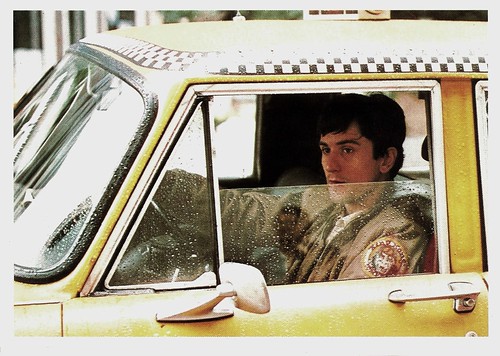
French postcard in the Collection Cinema Couleur by Edition La Malibran, Paris, no. MC 33, 1990. Photo: publicity still for Taxi Driver (Martin Scorsese, 1976).
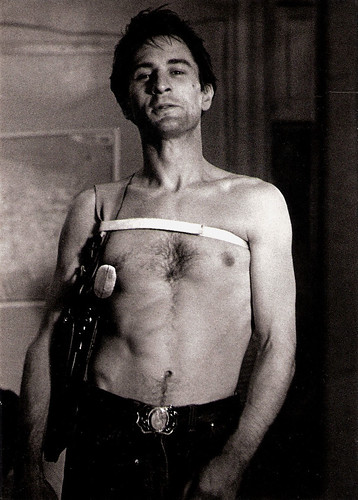
Belgian promotion card by Tasschen Gallery for the exhibition 'Taxi Driver - unseen photographs from Scorsese's Masterpiece'. Photo: Steve Schapiro. Publicity still for Taxi Driver (Martin Scorsese, 1976).

Spanish photo, no. BK-613. Photo: Warner Bros. Robert de Niro in The Mission (Roland Joffé, 1986). The Spanish title is 'La Mision'.
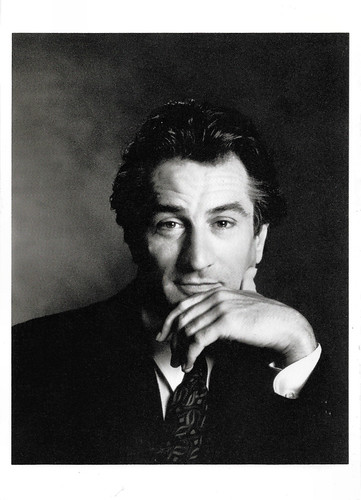
American postcard by Fotofolio, NY, NY, no. GG23. Photo: Greg Gorman. Caption: Robert de Niro, Los Angeles, 1990. Proceeds from the sale of this card benefit Make Love, Not AIDS.

British postcard by Pyramid, Leicester, no PC 8292. Caption: Robert DeNiro (sic) - Shirt & Tie.

Vintage postcard by Memory Card, no. 98. Lobby card of Robert de Niro in Heat (Michael Mann, 1995).
Robert Anthony De Niro was born in the Greenwich Village area of Manhattan, New York City in 1943. His mother, Virginia Admiral, was a cerebral and gifted painter, and his father, Robert De Niro Sr., was a painter, sculptor and poet whose work received high critical acclaim. They split ways in 1945, when young Robert was only 2 years old, after his father announced that he was gay. De Niro was raised primarily by his mother, who took on work as a typesetter and printer to support her son. A bright and energetic child, Robert De Niro was incredibly fond of attending films with his father when they spent time together. De Niro's mother worked part-time as a typist and copy editor for Maria Picator's Dramatic Workshop, and as part of her compensation, De Niro was allowed to take children's acting classes for free. At the age of 10, De Niro made his stage debut as the Cowardly Lion in a school production of The Wizard of Oz. De Niro proved to be uninterested in school altogether and, as a teenager, joined a rather tame street gang in Little Italy that gave him the nickname Bobby Milk, about his pale complexion. While De Niro was by all accounts only a very modest troublemaker, the gang provided him with experience to skilfully portray Italian mobsters as an actor.
He left school at age 16 to study acting Stella Adler Conservatory. Adler, who had taught Marlon Brando and Rod Steiger, was a strong proponent of the Stanislavski method of acting, involving deep psychological character investigation. He studied briefly with Lee Strasberg at the Actor's Studio in New York City, and then began auditioning. After a momentary cameo in the French film Trois chambres à Manhattan/Three Rooms in Manhattan (Marcel Carné, 1965), De Niro's real film debut came in Greetings (Brian De Palma, 1968). However, De Niro's first film role already came at the age of 20, when he appeared credited as Robert Denero in De Palma’s The Wedding Party (Brian De Palma, Wilford Leach, 1963), but the film was not released until 1969.
He then appeared in Roger Corman's film Bloody Mama (1970), featuring Shelley Winters. His breakthrough performances came a few years later in two highly acclaimed films: the sports drama Bang the Drum Slowly (John D. Hancock, 1973), in which he played a terminally ill catcher on a baseball team, and the crime film Mean Streets (1973), his first of many collaborations with director Martin Scorsese, in which he played street thug Johnny Boy opposite Harvey Keitel. De Niro and Martin Scorsese worked successfully together on eight films: Mean Streets (1973), Taxi Driver (1976), New York, New York (1977), Raging Bull (1980), The King of Comedy (1983), Goodfellas (1990), Cape Fear (1991), and Casino (1995).
In 1974, De Niro established himself as one of America’s finest actors with his Academy Award-winning portrayal of the young Vito Corleone in The Godfather: Part II (Francis Ford Coppola, 1974), a role for which he learned to speak Sicilian. Two years later, De Niro delivered perhaps the most chilling performance of his career, playing vengeful cabbie Travis Bickle in Taxi Driver (Martin Scorsese, 1976) alongside Jodie Foster. His iconic performance as Travis Bickle catapulted him to stardom and forever linked his name with Bickle's famous 'You talkin' to me?' monologue, which De Niro largely improvised.
In Italy, De Niro appeared opposite Gérard Dépardieu in the epic historical drama Novecento/1900 (Bernardo Bertolucci, 1976). The film is an exploration of life in Italy in the first half of the 20th century, seen through the eyes of two Italian childhood friends at opposite sides of society's hierarchy. He also starred in The Last Tycoon (1976), the last film directed by Elia Kazan. The Hollywood drama is based upon Harold Pinter's screenplay adaptation of F. Scott Fitzgerald's The Last Tycoon. De Niro continued to show his tremendous skill as a dramatic actor in the Vietnam War drama The Deer Hunter (Michael Cimino, 1978). The film follows a group of friends haunted by their Vietnam experiences. De Niro later portrayed middleweight boxer Jake LaMotta in the commercially unsuccessful but critically adored film Raging Bull (Martin Scorsese, 1980). The previously skinny De Niro had put on 60 pounds of muscle for his riveting turn as LaMotta and was rewarded for his dedication with the 1981 Academy Award for best actor.
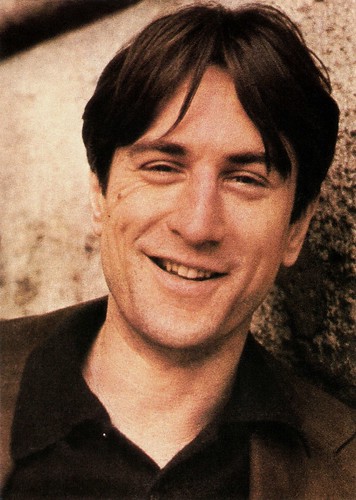
French postcard by Editions F. Nugeron, no. STAR 66. Photo: J. Ritchie / Classico, San Francisco.

French postcard by Humour à la Carte, Paris, no. 3706. Robert de Niro in The Godfather Part II (Francis Coppola, 1974).

British postcard by Memory Card, no. 530. Photo: Steve Schapiro. Jodie Foster and Robert de Niro in Taxi Driver (Martin Scorsese, 1976).

Vintage photo. Robert de Niro in Novecento / 1900 (Bernardo Bertolucci, 1976).

French postcard in the Collection Cinéma by Editions Art & Scene, Paris, no. CA 43. Robert de Niro in New York, New York (Martin Scorsese, 1977).

Dutch collector card in the 'Filmsterren: een Portret' series by Edito-Service S.A., 1994, no. D5 024 30-18. Photo: Kippa-Interpress. Robert de Niro in The Deer Hunter (Michael Cimino, 1978).
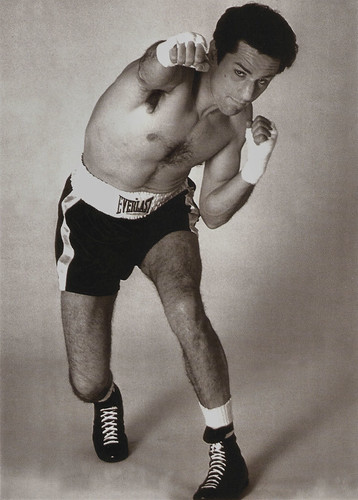
British postcard by Classic. Photo: publicity still for Raging Bull (Martin Scorsese, 1980).

Italian postcard by I.P.Z.S. - Libreria dello Stato, Roma, no. B28. Photo: Angelo Novi. Robert de Niro in C'era una volta in America / Once Upon a Time in America (Sergio Leone, 1984).

Vintage publicity photo. Meryl Streep and Robert De Niro in Falling in Love (Ulu Grosbard, 1984).
In the 1980s, Robert De Niro first roles were a worldly ambitious Catholic priest in True Confessions (Ulu Grosbard, 1981), an aspiring stand-up comedian in Scorsese's The King of Comedy (Martin Scorsese, 1983) and as a Jewish mobster in the sprawling historical epic Once Upon a Time in America (Sergio Leone, 1984).
Other notable projects included Sci-fi art film Brazil (Terry Gilliam, 1985) and the British drama The Mission (Roland Joffé, 1986), about the experiences of a Jesuit missionary in 18th-century South America, which won the Golden Palm at the Cannes Film Festival. It was followed by films like the crime drama The Untouchables (Brian De Palma, 1987), in which De Niro portrayed gangster Al Capone opposite Kevin Costner as Eliot Ness, the mysterious thriller Angel Heart (Alan Parker, 1987) and the action comedy Midnight Run (Martin Brest, 1988).
De Niro opened the 1990s with Goodfellas (Martin Scorsese, 1990), yet another acclaimed gangster film from Scorsese that saw the actor teaming up with Ray Liotta and Joe Pesci. De Niro next starred in a project that earned him another Oscar nomination, portraying a catatonic patient brought back to awareness in Awakenings (Penny Marshall, 1990), co-starring Robin Williams as a character based on physician Oliver Sacks. Dramas continued to be the genre of choice for De Niro, as he played a blacklisted director in Guilty by Suspicion (Irwin Winkler, 1991) and a fire chief in Backdraft (Ron Howard, 1991).
Soon afterwards, the actor was once again front and centre and reunited with Scorsese in a terrifying way, bulking up to become a tattooed rapist who stalks a family in Cape Fear (Martin Scorsese, 1991). The film was a remake of the 1962 thriller starring Gregory Peck and Robert Mitchum. Peck and Mitchum made appearances in the remake as well. De Niro received his sixth Academy Award nomination for Cape Fear, with the film becoming the highest-grossing collaboration between the actor and Scorsese, earning more than $182 million worldwide. After somewhat edgy, comedic outings like Night and the City (Irwin Winkler, 1992) and Mad Dog and Glory (John McNaughton, 1993), another drama followed in the form of This Boy's Life (Michael Caton-Jones, 1993), in which De Niro portrayed the abusive stepfather of a young Leonardo DiCaprio.
That same year, De Niro made his directorial debut with A Bronx Tale (Robert De Niro, 1993), a film adaptation of a one-man play written and performed by Chazz Palminteri. In 1994, De Niro was practically unrecognisable as the monster in actor-director Kenneth Branagh's adaptation of the Mary Shelley novel Frankenstein (Kenneth Branagh, 1994). It was followed by another Scorsese telling of mob life, this time in Las Vegas. De Niro portrayed a character based on real-life figure Frank ‘Lefty’ Rosenthal in Casino (Martin Scorsese, 1995), co-starring Sharon Stone and Joe Pesci. In Heat (Michael Mann, 1995), De Niro re-teamed with fellow Godfather star Al Pacino in a well-received outing about a bank robber contemplating getting out of the business and the police detective aiming to bring him down.

Canadian postcard by Canadian Postcard, no. A-3. Robert de Niro in The Mission (Roland Joffé, 1986).
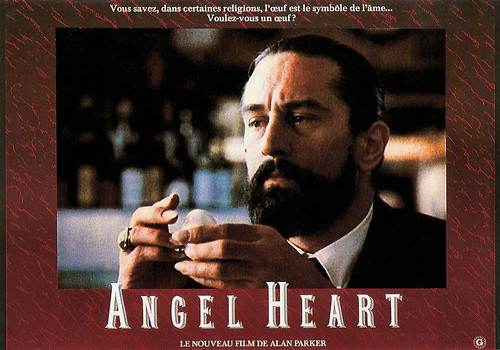
French postcard by Humour à la Carte, Paris, no. A-C 1259. Photo: Gaumont. Robert De Niro in Angel Heart (Alan Parker, 1987). Caption: You know, in certain religions, the egg is the symbol of a soul.... Would you like an egg?
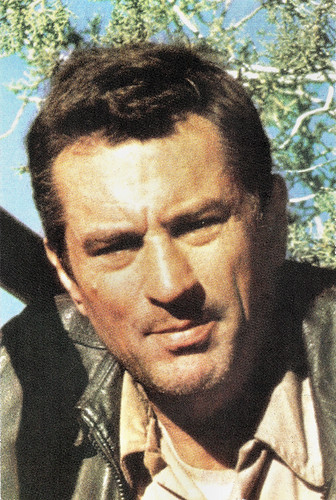
Romanian postcard by Casa Filmului Acin. Photo: publicity still for Midnight Run (Martin Brest, 1988).

British postcard by Pyramid, Leicester, no. PC8258. Robert de Niro in Cape Fear (Martin Scorsese, 1991).

Dutch postcard by Boomerang, Amsterdam. Photo: UIP / Universal. Robert de Niro in Casino (Martin Scorsese, 1995).

Italian postcard by Edizioni Eden, Milano, for Solo Belli monthly, 1995.

Vintage postcard by Memory Card, no. 96. Lobby card of Robert de Niro in Heat (Michael Mann, 1995).
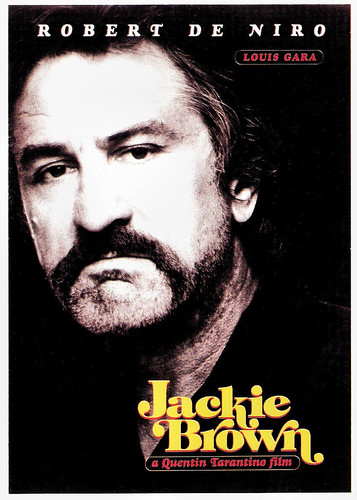
French postcard, no. 654. Photo: publicity still for Jackie Brown (Quentin Tarantino, 1997) with Robert De Niro as Louis Gara.

Vintage postcard in the Cinemascope Collection, no. 164. Robert de Niro in Ronin (John Frankenheimer, 1998).
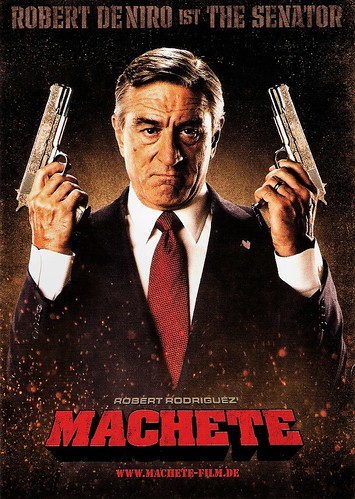
German postcard by CTMG, 2010. Photo: publicity still for Machete (Ethan Maniquis, Robert Rodriguez, 2010) with Robert De Niro as Senator McLaughlin.
For the rest of the 1990s and into the new millennium, Robert De Niro featured yearly in a big-screen project as either a lead or supporting figure. His films include the legal crime drama Sleepers (Barry Levinson, 1996), the black comedy Wag the Dog (Barry Levinson, 1997), the crime drama Cop Land (James Mangold, 1997), the crime thriller Jackie Brown (Quentin Tarantino, 1997), the spy action-thriller Ronin (John Frankenheimer, 1998) and the crime comedy-drama Flawless (Joel Schumacher, 1999). At the turn of the century, De Niro struck out into decidedly different territory with Analyze This (Harold Ramis, 1999), a hilarious and highly popular spoof of the mob movies that had garnered him fame. Analyze This earned more than $100 million domestically, with De Niro playing a Mafioso who seeks help from a psychiatrist (Billy Crystal). De Niro took on another comedy, Meet the Parents (Jay Roach, 2000), as Ben Stiller's future father-in-law. The smash hit spawned two sequels: Meet the Fockers (Jay Roach, 2004) and Little Fockers (Paul Weitz, 2011), both of which were also box-office successes.
De Niro continued to switch between comedic and serious roles over the next few years, reuniting with Billy Crystal for Analyze That (Harold Ramis, 2002), and starring in the spy thriller The Good Shepherd (Robert De Niro, 2006) with Matt Damon and Angelina Jolie. The following year, De Niro was featured as a secretive cross-dressing pirate with a heart of gold in the fantasy flick Stardust (Matthew Vaughn, 2007), while 2009 saw a return to dramatic fare with Everybody's Fine (Kirk Jones, 2009). In Italy, De Niro starred in the romantic comedy Manuale d'amore 3/The Ages of Love (Giovanni Veronesi, 2011).
De Niro earned yet another Academy Award nomination for his turn in David O. Russell's Silver Linings Playbook (2012), playing the father of a mentally troubled son (Bradley Cooper). De Niro teamed up again with Silver Linings Playbook director Russell and stars Cooper and Jennifer Lawrence for the biopic Joy (David O. Russell, 2015), based on the life of Miracle Mop inventor Joy Mangano. Later that year, De Niro starred as a widower who returns to the workforce in The Intern (Nancy Meyers, 2015), with Anne Hathaway. In 2016, he starred in another biopic, Hands of Stone (Jonathan Jakubowicz, 2016), playing Ray Arcel, the trainer of Panamanian boxer Roberto Durán. That same year, De Niro received the Presidential Medal of Freedom from President Obama for his contribution to the arts.
In 2019, De Niro played a secondary role as Murray Franklin, a talk-show host, in the acclaimed Joker (Todd Phillips, 2019), starring Joaquin Phoenix as the DC Comics character, the Joker. De Niro's character echoes that of Jerry Lewis in The King of Comedy (Martin Scorsese, 1983), in which De Niro played the lead role. The film was a box-office triumph worldwide and received rave reviews from critics. For his portrayal of Robert Mueller alongside Alec Baldwin as Donald Trump in various episodes of Saturday Night Live, he received an Emmy nomination for Best Guest in a Comedy Series. The Irishman (Martin Scorsese, 2019), a gangster film based on the novel 'I Heard You Paint Houses', was his ninth feature film collaboration with Martin Scorsese. De Niro, who played Frank ‘The Irishman’ Sheeran, reunited with Al Pacino, Harvey Keitel, and Joe Pesci. The film, which became the director's longest at 210 minutes, was acclaimed. His next reunion with Scorsese, Killers of the Flower Moon (Martin Scorsese, 2023), with Leonardo DiCaprio, recounts the murders of the Osage Indians. De Niro played rancher William Hale, one of the FBI's prime suspects. The film premiered at the 2023 Cannes Film Festival and received excellent reviews, as did De Niro.
Robert De Niro, who has long resided in New York City, has been investing in Manhattan's Tribeca neighbourhood since 1989. His capital ventures there included co-founding the film studio TriBeCa Productions in 1998 and the Tribeca Film Festival (since 2002). De Niro married actress Diahnne Abbott in 1976. The couple had one son, Raphael, before divorcing 12 years later, in 1988. De Niro then had a long relationship with model Toukie Smith that produced twin sons, Aaron Kendrick and Julian Henry, in 1995. Then in 1997, De Niro married Grace Hightower, with whom he has two children.

French postcard by Editions F. Nugeron, no. E 434. Image: French poster of New York, New York (Martin Scorsese, 1977) starring Liza Minnelli and Robert De Niro.

French postcard, 1990s. Poster postcard of Goodfellas (Martin Scorsese, 1990) with Ray Liotta, Robert de Niro, and Joe Pesci.
Trailer Novecento/1900 (1976). Source: Eurekaentertainment (YouTube).
Trailer Raging Bull (1980). Source: Movieclips Trailer Vault (YouTube).
Trailer The Mission (1986). Source: Warner Bros. (YouTube).
Trailer for Analyze This (1999). Source: Movieclips Trailer Vault (YouTube).
Sources: Biography.com, Wikipedia, and IMDb.

Italian postcard by Edizioni Beatrice D'Este, no. 20 162. Photo: Steve Schapiro. Robert De Niro in Taxi Driver (Martin Scorsese, 1976).

French postcard in the Collection Cinema Couleur by Edition La Malibran, Paris, no. MC 33, 1990. Photo: publicity still for Taxi Driver (Martin Scorsese, 1976).

Belgian promotion card by Tasschen Gallery for the exhibition 'Taxi Driver - unseen photographs from Scorsese's Masterpiece'. Photo: Steve Schapiro. Publicity still for Taxi Driver (Martin Scorsese, 1976).

Spanish photo, no. BK-613. Photo: Warner Bros. Robert de Niro in The Mission (Roland Joffé, 1986). The Spanish title is 'La Mision'.

American postcard by Fotofolio, NY, NY, no. GG23. Photo: Greg Gorman. Caption: Robert de Niro, Los Angeles, 1990. Proceeds from the sale of this card benefit Make Love, Not AIDS.

British postcard by Pyramid, Leicester, no PC 8292. Caption: Robert DeNiro (sic) - Shirt & Tie.

Vintage postcard by Memory Card, no. 98. Lobby card of Robert de Niro in Heat (Michael Mann, 1995).
The most chilling performance of his career
Robert Anthony De Niro was born in the Greenwich Village area of Manhattan, New York City in 1943. His mother, Virginia Admiral, was a cerebral and gifted painter, and his father, Robert De Niro Sr., was a painter, sculptor and poet whose work received high critical acclaim. They split ways in 1945, when young Robert was only 2 years old, after his father announced that he was gay. De Niro was raised primarily by his mother, who took on work as a typesetter and printer to support her son. A bright and energetic child, Robert De Niro was incredibly fond of attending films with his father when they spent time together. De Niro's mother worked part-time as a typist and copy editor for Maria Picator's Dramatic Workshop, and as part of her compensation, De Niro was allowed to take children's acting classes for free. At the age of 10, De Niro made his stage debut as the Cowardly Lion in a school production of The Wizard of Oz. De Niro proved to be uninterested in school altogether and, as a teenager, joined a rather tame street gang in Little Italy that gave him the nickname Bobby Milk, about his pale complexion. While De Niro was by all accounts only a very modest troublemaker, the gang provided him with experience to skilfully portray Italian mobsters as an actor.
He left school at age 16 to study acting Stella Adler Conservatory. Adler, who had taught Marlon Brando and Rod Steiger, was a strong proponent of the Stanislavski method of acting, involving deep psychological character investigation. He studied briefly with Lee Strasberg at the Actor's Studio in New York City, and then began auditioning. After a momentary cameo in the French film Trois chambres à Manhattan/Three Rooms in Manhattan (Marcel Carné, 1965), De Niro's real film debut came in Greetings (Brian De Palma, 1968). However, De Niro's first film role already came at the age of 20, when he appeared credited as Robert Denero in De Palma’s The Wedding Party (Brian De Palma, Wilford Leach, 1963), but the film was not released until 1969.
He then appeared in Roger Corman's film Bloody Mama (1970), featuring Shelley Winters. His breakthrough performances came a few years later in two highly acclaimed films: the sports drama Bang the Drum Slowly (John D. Hancock, 1973), in which he played a terminally ill catcher on a baseball team, and the crime film Mean Streets (1973), his first of many collaborations with director Martin Scorsese, in which he played street thug Johnny Boy opposite Harvey Keitel. De Niro and Martin Scorsese worked successfully together on eight films: Mean Streets (1973), Taxi Driver (1976), New York, New York (1977), Raging Bull (1980), The King of Comedy (1983), Goodfellas (1990), Cape Fear (1991), and Casino (1995).
In 1974, De Niro established himself as one of America’s finest actors with his Academy Award-winning portrayal of the young Vito Corleone in The Godfather: Part II (Francis Ford Coppola, 1974), a role for which he learned to speak Sicilian. Two years later, De Niro delivered perhaps the most chilling performance of his career, playing vengeful cabbie Travis Bickle in Taxi Driver (Martin Scorsese, 1976) alongside Jodie Foster. His iconic performance as Travis Bickle catapulted him to stardom and forever linked his name with Bickle's famous 'You talkin' to me?' monologue, which De Niro largely improvised.
In Italy, De Niro appeared opposite Gérard Dépardieu in the epic historical drama Novecento/1900 (Bernardo Bertolucci, 1976). The film is an exploration of life in Italy in the first half of the 20th century, seen through the eyes of two Italian childhood friends at opposite sides of society's hierarchy. He also starred in The Last Tycoon (1976), the last film directed by Elia Kazan. The Hollywood drama is based upon Harold Pinter's screenplay adaptation of F. Scott Fitzgerald's The Last Tycoon. De Niro continued to show his tremendous skill as a dramatic actor in the Vietnam War drama The Deer Hunter (Michael Cimino, 1978). The film follows a group of friends haunted by their Vietnam experiences. De Niro later portrayed middleweight boxer Jake LaMotta in the commercially unsuccessful but critically adored film Raging Bull (Martin Scorsese, 1980). The previously skinny De Niro had put on 60 pounds of muscle for his riveting turn as LaMotta and was rewarded for his dedication with the 1981 Academy Award for best actor.

French postcard by Editions F. Nugeron, no. STAR 66. Photo: J. Ritchie / Classico, San Francisco.

French postcard by Humour à la Carte, Paris, no. 3706. Robert de Niro in The Godfather Part II (Francis Coppola, 1974).

British postcard by Memory Card, no. 530. Photo: Steve Schapiro. Jodie Foster and Robert de Niro in Taxi Driver (Martin Scorsese, 1976).

Vintage photo. Robert de Niro in Novecento / 1900 (Bernardo Bertolucci, 1976).

French postcard in the Collection Cinéma by Editions Art & Scene, Paris, no. CA 43. Robert de Niro in New York, New York (Martin Scorsese, 1977).

Dutch collector card in the 'Filmsterren: een Portret' series by Edito-Service S.A., 1994, no. D5 024 30-18. Photo: Kippa-Interpress. Robert de Niro in The Deer Hunter (Michael Cimino, 1978).

British postcard by Classic. Photo: publicity still for Raging Bull (Martin Scorsese, 1980).

Italian postcard by I.P.Z.S. - Libreria dello Stato, Roma, no. B28. Photo: Angelo Novi. Robert de Niro in C'era una volta in America / Once Upon a Time in America (Sergio Leone, 1984).

Vintage publicity photo. Meryl Streep and Robert De Niro in Falling in Love (Ulu Grosbard, 1984).
Reunited in a terrifying way
In the 1980s, Robert De Niro first roles were a worldly ambitious Catholic priest in True Confessions (Ulu Grosbard, 1981), an aspiring stand-up comedian in Scorsese's The King of Comedy (Martin Scorsese, 1983) and as a Jewish mobster in the sprawling historical epic Once Upon a Time in America (Sergio Leone, 1984).
Other notable projects included Sci-fi art film Brazil (Terry Gilliam, 1985) and the British drama The Mission (Roland Joffé, 1986), about the experiences of a Jesuit missionary in 18th-century South America, which won the Golden Palm at the Cannes Film Festival. It was followed by films like the crime drama The Untouchables (Brian De Palma, 1987), in which De Niro portrayed gangster Al Capone opposite Kevin Costner as Eliot Ness, the mysterious thriller Angel Heart (Alan Parker, 1987) and the action comedy Midnight Run (Martin Brest, 1988).
De Niro opened the 1990s with Goodfellas (Martin Scorsese, 1990), yet another acclaimed gangster film from Scorsese that saw the actor teaming up with Ray Liotta and Joe Pesci. De Niro next starred in a project that earned him another Oscar nomination, portraying a catatonic patient brought back to awareness in Awakenings (Penny Marshall, 1990), co-starring Robin Williams as a character based on physician Oliver Sacks. Dramas continued to be the genre of choice for De Niro, as he played a blacklisted director in Guilty by Suspicion (Irwin Winkler, 1991) and a fire chief in Backdraft (Ron Howard, 1991).
Soon afterwards, the actor was once again front and centre and reunited with Scorsese in a terrifying way, bulking up to become a tattooed rapist who stalks a family in Cape Fear (Martin Scorsese, 1991). The film was a remake of the 1962 thriller starring Gregory Peck and Robert Mitchum. Peck and Mitchum made appearances in the remake as well. De Niro received his sixth Academy Award nomination for Cape Fear, with the film becoming the highest-grossing collaboration between the actor and Scorsese, earning more than $182 million worldwide. After somewhat edgy, comedic outings like Night and the City (Irwin Winkler, 1992) and Mad Dog and Glory (John McNaughton, 1993), another drama followed in the form of This Boy's Life (Michael Caton-Jones, 1993), in which De Niro portrayed the abusive stepfather of a young Leonardo DiCaprio.
That same year, De Niro made his directorial debut with A Bronx Tale (Robert De Niro, 1993), a film adaptation of a one-man play written and performed by Chazz Palminteri. In 1994, De Niro was practically unrecognisable as the monster in actor-director Kenneth Branagh's adaptation of the Mary Shelley novel Frankenstein (Kenneth Branagh, 1994). It was followed by another Scorsese telling of mob life, this time in Las Vegas. De Niro portrayed a character based on real-life figure Frank ‘Lefty’ Rosenthal in Casino (Martin Scorsese, 1995), co-starring Sharon Stone and Joe Pesci. In Heat (Michael Mann, 1995), De Niro re-teamed with fellow Godfather star Al Pacino in a well-received outing about a bank robber contemplating getting out of the business and the police detective aiming to bring him down.

Canadian postcard by Canadian Postcard, no. A-3. Robert de Niro in The Mission (Roland Joffé, 1986).

French postcard by Humour à la Carte, Paris, no. A-C 1259. Photo: Gaumont. Robert De Niro in Angel Heart (Alan Parker, 1987). Caption: You know, in certain religions, the egg is the symbol of a soul.... Would you like an egg?

Romanian postcard by Casa Filmului Acin. Photo: publicity still for Midnight Run (Martin Brest, 1988).

British postcard by Pyramid, Leicester, no. PC8258. Robert de Niro in Cape Fear (Martin Scorsese, 1991).

Dutch postcard by Boomerang, Amsterdam. Photo: UIP / Universal. Robert de Niro in Casino (Martin Scorsese, 1995).

Italian postcard by Edizioni Eden, Milano, for Solo Belli monthly, 1995.

Vintage postcard by Memory Card, no. 96. Lobby card of Robert de Niro in Heat (Michael Mann, 1995).

French postcard, no. 654. Photo: publicity still for Jackie Brown (Quentin Tarantino, 1997) with Robert De Niro as Louis Gara.

Vintage postcard in the Cinemascope Collection, no. 164. Robert de Niro in Ronin (John Frankenheimer, 1998).

German postcard by CTMG, 2010. Photo: publicity still for Machete (Ethan Maniquis, Robert Rodriguez, 2010) with Robert De Niro as Senator McLaughlin.
Striking out into decidedly different territory
For the rest of the 1990s and into the new millennium, Robert De Niro featured yearly in a big-screen project as either a lead or supporting figure. His films include the legal crime drama Sleepers (Barry Levinson, 1996), the black comedy Wag the Dog (Barry Levinson, 1997), the crime drama Cop Land (James Mangold, 1997), the crime thriller Jackie Brown (Quentin Tarantino, 1997), the spy action-thriller Ronin (John Frankenheimer, 1998) and the crime comedy-drama Flawless (Joel Schumacher, 1999). At the turn of the century, De Niro struck out into decidedly different territory with Analyze This (Harold Ramis, 1999), a hilarious and highly popular spoof of the mob movies that had garnered him fame. Analyze This earned more than $100 million domestically, with De Niro playing a Mafioso who seeks help from a psychiatrist (Billy Crystal). De Niro took on another comedy, Meet the Parents (Jay Roach, 2000), as Ben Stiller's future father-in-law. The smash hit spawned two sequels: Meet the Fockers (Jay Roach, 2004) and Little Fockers (Paul Weitz, 2011), both of which were also box-office successes.
De Niro continued to switch between comedic and serious roles over the next few years, reuniting with Billy Crystal for Analyze That (Harold Ramis, 2002), and starring in the spy thriller The Good Shepherd (Robert De Niro, 2006) with Matt Damon and Angelina Jolie. The following year, De Niro was featured as a secretive cross-dressing pirate with a heart of gold in the fantasy flick Stardust (Matthew Vaughn, 2007), while 2009 saw a return to dramatic fare with Everybody's Fine (Kirk Jones, 2009). In Italy, De Niro starred in the romantic comedy Manuale d'amore 3/The Ages of Love (Giovanni Veronesi, 2011).
De Niro earned yet another Academy Award nomination for his turn in David O. Russell's Silver Linings Playbook (2012), playing the father of a mentally troubled son (Bradley Cooper). De Niro teamed up again with Silver Linings Playbook director Russell and stars Cooper and Jennifer Lawrence for the biopic Joy (David O. Russell, 2015), based on the life of Miracle Mop inventor Joy Mangano. Later that year, De Niro starred as a widower who returns to the workforce in The Intern (Nancy Meyers, 2015), with Anne Hathaway. In 2016, he starred in another biopic, Hands of Stone (Jonathan Jakubowicz, 2016), playing Ray Arcel, the trainer of Panamanian boxer Roberto Durán. That same year, De Niro received the Presidential Medal of Freedom from President Obama for his contribution to the arts.
In 2019, De Niro played a secondary role as Murray Franklin, a talk-show host, in the acclaimed Joker (Todd Phillips, 2019), starring Joaquin Phoenix as the DC Comics character, the Joker. De Niro's character echoes that of Jerry Lewis in The King of Comedy (Martin Scorsese, 1983), in which De Niro played the lead role. The film was a box-office triumph worldwide and received rave reviews from critics. For his portrayal of Robert Mueller alongside Alec Baldwin as Donald Trump in various episodes of Saturday Night Live, he received an Emmy nomination for Best Guest in a Comedy Series. The Irishman (Martin Scorsese, 2019), a gangster film based on the novel 'I Heard You Paint Houses', was his ninth feature film collaboration with Martin Scorsese. De Niro, who played Frank ‘The Irishman’ Sheeran, reunited with Al Pacino, Harvey Keitel, and Joe Pesci. The film, which became the director's longest at 210 minutes, was acclaimed. His next reunion with Scorsese, Killers of the Flower Moon (Martin Scorsese, 2023), with Leonardo DiCaprio, recounts the murders of the Osage Indians. De Niro played rancher William Hale, one of the FBI's prime suspects. The film premiered at the 2023 Cannes Film Festival and received excellent reviews, as did De Niro.
Robert De Niro, who has long resided in New York City, has been investing in Manhattan's Tribeca neighbourhood since 1989. His capital ventures there included co-founding the film studio TriBeCa Productions in 1998 and the Tribeca Film Festival (since 2002). De Niro married actress Diahnne Abbott in 1976. The couple had one son, Raphael, before divorcing 12 years later, in 1988. De Niro then had a long relationship with model Toukie Smith that produced twin sons, Aaron Kendrick and Julian Henry, in 1995. Then in 1997, De Niro married Grace Hightower, with whom he has two children.

French postcard by Editions F. Nugeron, no. E 434. Image: French poster of New York, New York (Martin Scorsese, 1977) starring Liza Minnelli and Robert De Niro.

French postcard, 1990s. Poster postcard of Goodfellas (Martin Scorsese, 1990) with Ray Liotta, Robert de Niro, and Joe Pesci.
Trailer Novecento/1900 (1976). Source: Eurekaentertainment (YouTube).
Trailer Raging Bull (1980). Source: Movieclips Trailer Vault (YouTube).
Trailer The Mission (1986). Source: Warner Bros. (YouTube).
Trailer for Analyze This (1999). Source: Movieclips Trailer Vault (YouTube).
Sources: Biography.com, Wikipedia, and IMDb.
1 comment:
Wonderful post. I always liked DeNiro's performance in The Bridge at San Luis Rey. Not a good movie but he is good in it. Playing a priest yet again. Ironic that an actor who excels at dark textures would also be so great as a priest.
Post a Comment